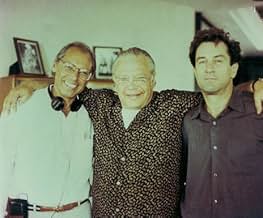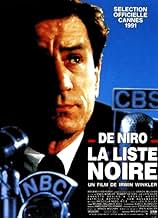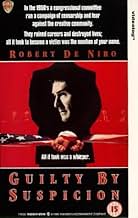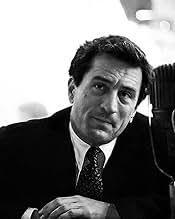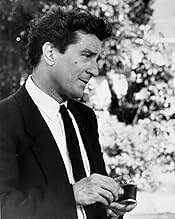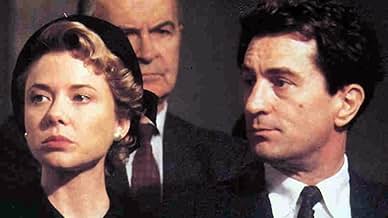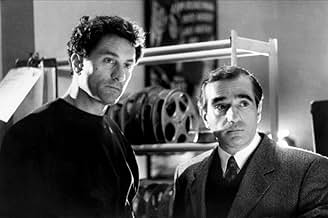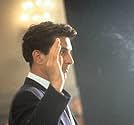VALUTAZIONE IMDb
6,5/10
10.038
LA TUA VALUTAZIONE
Tornato ad Hollywood nel 1951 dopo aver lavorato in Francia, un regista cinematografico si scontra con la politica di McCarthy.Tornato ad Hollywood nel 1951 dopo aver lavorato in Francia, un regista cinematografico si scontra con la politica di McCarthy.Tornato ad Hollywood nel 1951 dopo aver lavorato in Francia, un regista cinematografico si scontra con la politica di McCarthy.
- Regia
- Sceneggiatura
- Star
- Premi
- 2 vittorie e 2 candidature totali
Roxann Dawson
- Felicia Barron
- (as Roxann Biggs)
Recensioni in evidenza
Some Americans today may never have heard of Senator Joseph McCarthy and McCarthyism. McCarthyism is the practice of making accusations of subversion or treason without proper regard for evidence. The term refers to U.S. senator Joseph McCarthy (R-Wisconsin) and has its origins in the period in the United States known as the Second Red Scare, lasting from the late 1940s through the 1950s. It was characterized by heightened political repression and a campaign spreading fear of communist influence on American institutions and of espionage by Soviet agents. After the mid-1950s, McCarthyism began to decline, mainly due to the gradual loss of public popularity and opposition from the U.S. Supreme Court led by Chief Justice Earl Warren. The Warren Court made a series of rulings that helped bring an end to McCarthyism.
The movie "Guilty by Suspicion" takes place in Hollywood during the height of the Second Red Scare. The movie focuses on David Merrill (Robert De Niro) though he is indicative of many Hollywood personnel affected by the Communist witch hunting.
David, by all indications, was a gainfully employed movie director that was in constant demand. He would have been able to stay gainfully employed so long as he told the F.B.I. what they wanted to hear. And they wanted to hear that certain friends of David's were Communists. David, valuing friendship over finances, opted to keep quiet about any of his friends activities. For that, David was put on the Hollywood blacklist.
"Guilty by Suspicion" is a weighty movie. We get an up close and personal look at what McCarthyism was doing to people's lives. Now I know that some of you may be saying, "Who cares? It was Hollywood." To that I would say that the Constitution never put zoning restrictions on who it applied to. The Constitution didn't have a Hollywood exemption in it and the U.S. government was trampling all over people's Constitutional rights. If they didn't have enemies within the U.S. they were certainly making them.
The movie "Guilty by Suspicion" takes place in Hollywood during the height of the Second Red Scare. The movie focuses on David Merrill (Robert De Niro) though he is indicative of many Hollywood personnel affected by the Communist witch hunting.
David, by all indications, was a gainfully employed movie director that was in constant demand. He would have been able to stay gainfully employed so long as he told the F.B.I. what they wanted to hear. And they wanted to hear that certain friends of David's were Communists. David, valuing friendship over finances, opted to keep quiet about any of his friends activities. For that, David was put on the Hollywood blacklist.
"Guilty by Suspicion" is a weighty movie. We get an up close and personal look at what McCarthyism was doing to people's lives. Now I know that some of you may be saying, "Who cares? It was Hollywood." To that I would say that the Constitution never put zoning restrictions on who it applied to. The Constitution didn't have a Hollywood exemption in it and the U.S. government was trampling all over people's Constitutional rights. If they didn't have enemies within the U.S. they were certainly making them.
In 1947 the House Committee on Un-American Activities began an investigation into Communism in Hollywood. Shortly after this director David Merrill returns from filming abroad. It is not long before he is targeted for having attended "a few meetings" a few years ago. The approach is softly, softly with the committee just wanting Merrill to name some more names for them. When he refuses to help, he finds himself gradually cut out of studios and projects, with fewer and fewer people willing to take his calls.
The period of history around which this film is set is an interesting one and one that is worth knowing about as part of the whole "learning from history" ideal. However this is not the same as the film itself being good because unfortunately it is not what I would have liked. It relies too heavily on the informative nature of the recreation of the period rather than developing an interesting script with realistic characters. It doesn't help that the film tries to be all very serious and respectful but does rather fail and ends up coming over all earnest and self important. The script also tries not to really upset anyone who didn't take the moral stance of the fictional Merrill by just focusing on him even though it would have been a lot more interesting if it had had outrage, bitterness and realism at its heart.
Winkler directs without a great deal of style and his courtroom scene is average where it should have been the best scene of the film. De Niro works his material hard and makes for an engaging lead, however it is the lack of depth and complexity in his material that limits his performance. This is more or less true of the rest of the cast which, although starry, doesn't really provide anyone in particular with an opportunity to mark themselves out. Bening, Wendt, Wettig, Wanamaker, Sizemore, Scorsese, Cooper and others are good presences but not much more than that.
Overall then an interesting film in so much as it informs about an important period of history. However it is all very earnest and safe and lost a lot of potential for me. The cast is starry but the material is middle-of-the-road and didn't give anyone the complexity and outrage that the subject deserved.
The period of history around which this film is set is an interesting one and one that is worth knowing about as part of the whole "learning from history" ideal. However this is not the same as the film itself being good because unfortunately it is not what I would have liked. It relies too heavily on the informative nature of the recreation of the period rather than developing an interesting script with realistic characters. It doesn't help that the film tries to be all very serious and respectful but does rather fail and ends up coming over all earnest and self important. The script also tries not to really upset anyone who didn't take the moral stance of the fictional Merrill by just focusing on him even though it would have been a lot more interesting if it had had outrage, bitterness and realism at its heart.
Winkler directs without a great deal of style and his courtroom scene is average where it should have been the best scene of the film. De Niro works his material hard and makes for an engaging lead, however it is the lack of depth and complexity in his material that limits his performance. This is more or less true of the rest of the cast which, although starry, doesn't really provide anyone in particular with an opportunity to mark themselves out. Bening, Wendt, Wettig, Wanamaker, Sizemore, Scorsese, Cooper and others are good presences but not much more than that.
Overall then an interesting film in so much as it informs about an important period of history. However it is all very earnest and safe and lost a lot of potential for me. The cast is starry but the material is middle-of-the-road and didn't give anyone the complexity and outrage that the subject deserved.
This is a fairly good movie. It provides a compelling dramatic struggle and captures the paranoia of an era. However, like many Hollywood movies, it strives more to create a dramatic story than an accurate one.
This movie was originally to be based on the life of blacklisted writer/director Abraham Polonsky (Force of Evil, Body and Soul). Polonsky was working in France at the time of the HUAC hearings and a friend called to tell him not to come back or he'd be called to testify. He deliberately came back for the express purpose of telling HUAC where they could stick it. This is a good story as an anecdote, but not a great story for a movie.
The one place in which this movie (and many other movies) softens the history is by making the protagonist politically neutral. It is certainly true that many people accused were not communists or had only attended a meeting out of curiosity, but this is not true for everybody. Many of these people were devout socialists. As Polonsky has said on occasion "During the Great Depression, anybody with a brain considered Communism. The Capitalist system was BROKE. Communism looked like a smart bet." While many of these people reconsidered as the nation returned to prosperity, a large number did not.
Most of the famous Hollywood Ten were still believers in socialism when they were blacklisted. There is no evidence that any of them were spies for the Soviet Union-- many of them had already learned that the USSR was not the socialist paradise they dreamed of-- but they did believe in the writings of Mark and Engels. It is also true that they placed socialist themes in their films. They created gangsters who only cared about money, families screwed over by greedy real estate brokers and poor saps who put it all in the stock market.
However, none of this was illegal. They had every right to believe in whatever politics they chose to. They had every right to create these films-- and their movies seemed to have a resonance with the audience. They're lives and careers were destroyed because they held political beliefs that some viewed as threatening.
I also want to point out that Elia Kazan was not the model for this film. Elia Kazan has been repeatedly condemned by Polonsky and others who were blacklisted. He chose to name names and to allow the HUAC to bully him. I don't condemn him for this like other people. As this movie shows, so much was on the line for people who HUAC sets their sights on. Kazan cracked. He failed to be a hero, when the time came. This doesn't mark him a coward, merely something less than a hero. "On the Waterfront," while not a direct explanation of his actions, is an excellent look at his state of mind around that time.
While yes, I have not spent much time reviewing this movie, I felt it necessary to set the record straight about history.
This movie was originally to be based on the life of blacklisted writer/director Abraham Polonsky (Force of Evil, Body and Soul). Polonsky was working in France at the time of the HUAC hearings and a friend called to tell him not to come back or he'd be called to testify. He deliberately came back for the express purpose of telling HUAC where they could stick it. This is a good story as an anecdote, but not a great story for a movie.
The one place in which this movie (and many other movies) softens the history is by making the protagonist politically neutral. It is certainly true that many people accused were not communists or had only attended a meeting out of curiosity, but this is not true for everybody. Many of these people were devout socialists. As Polonsky has said on occasion "During the Great Depression, anybody with a brain considered Communism. The Capitalist system was BROKE. Communism looked like a smart bet." While many of these people reconsidered as the nation returned to prosperity, a large number did not.
Most of the famous Hollywood Ten were still believers in socialism when they were blacklisted. There is no evidence that any of them were spies for the Soviet Union-- many of them had already learned that the USSR was not the socialist paradise they dreamed of-- but they did believe in the writings of Mark and Engels. It is also true that they placed socialist themes in their films. They created gangsters who only cared about money, families screwed over by greedy real estate brokers and poor saps who put it all in the stock market.
However, none of this was illegal. They had every right to believe in whatever politics they chose to. They had every right to create these films-- and their movies seemed to have a resonance with the audience. They're lives and careers were destroyed because they held political beliefs that some viewed as threatening.
I also want to point out that Elia Kazan was not the model for this film. Elia Kazan has been repeatedly condemned by Polonsky and others who were blacklisted. He chose to name names and to allow the HUAC to bully him. I don't condemn him for this like other people. As this movie shows, so much was on the line for people who HUAC sets their sights on. Kazan cracked. He failed to be a hero, when the time came. This doesn't mark him a coward, merely something less than a hero. "On the Waterfront," while not a direct explanation of his actions, is an excellent look at his state of mind around that time.
While yes, I have not spent much time reviewing this movie, I felt it necessary to set the record straight about history.
It's almost impossible to write any kind of objective film about the blacklist, the wounds of it run deep in show business. Guilty By Suspicion has no pretense to objectivity, neither does that John Wayne epic Big Jim McLain which was favorable to the House Un American Activities Committee.
Those who gave testimony at HUAC did so for a variety of motives. Some like Adolphe Menjou wanted the blacklist for everyone to the left of Herbert Hoover. Some like Robert Taylor felt they were doing a patriotic service. Some under the threat of not being able to work as artists in their chosen profession named names before HUAC. A very select few said stick it in your ear.
If there any guilty parties it's not the artists whatever their political persuasion. It was the studio bosses and one of them, Darryl F. Zanuck is played here by Ben Piazza, who gave in without exception to HUAC and cooperated in the blacklist, who pitted the people of various political persuasions against each other. Sad to say that's not really demonstrated here in Guilty By Suspicion.
The members of HUAC were 95% on the political right of both parties. The Democrats were mostly southerners and the Republicans were on the right in their party. The liberals of either party had more constructive ways to spend their time in Congess.
Guilty By Suspicion tells the story of Robert DeNiro as a fictional film director who gets blacklisted because of secret hearing testimony given by Chris Cooper. His struggle to find work turns positively Kafkaesque until he agrees to go before the committee.
DeNiro strikes all the right notes in his performance and is aided and abetted by the performance of Annette Bening as his estranged wife. Acting honors however go to Patricia Wettig who plays a distraught blacklisted actress with a drinking problem to start with.
Guilty By Suspicion is not the ultimate telling of the blacklist's story, but it's still pretty good and does get a feel for the times the story is set in.
Those who gave testimony at HUAC did so for a variety of motives. Some like Adolphe Menjou wanted the blacklist for everyone to the left of Herbert Hoover. Some like Robert Taylor felt they were doing a patriotic service. Some under the threat of not being able to work as artists in their chosen profession named names before HUAC. A very select few said stick it in your ear.
If there any guilty parties it's not the artists whatever their political persuasion. It was the studio bosses and one of them, Darryl F. Zanuck is played here by Ben Piazza, who gave in without exception to HUAC and cooperated in the blacklist, who pitted the people of various political persuasions against each other. Sad to say that's not really demonstrated here in Guilty By Suspicion.
The members of HUAC were 95% on the political right of both parties. The Democrats were mostly southerners and the Republicans were on the right in their party. The liberals of either party had more constructive ways to spend their time in Congess.
Guilty By Suspicion tells the story of Robert DeNiro as a fictional film director who gets blacklisted because of secret hearing testimony given by Chris Cooper. His struggle to find work turns positively Kafkaesque until he agrees to go before the committee.
DeNiro strikes all the right notes in his performance and is aided and abetted by the performance of Annette Bening as his estranged wife. Acting honors however go to Patricia Wettig who plays a distraught blacklisted actress with a drinking problem to start with.
Guilty By Suspicion is not the ultimate telling of the blacklist's story, but it's still pretty good and does get a feel for the times the story is set in.
Director David Merrill (Robert De Niro) returns from filming in France to find the country over-run by the Red Scare. People are all taking loyalty oaths. The House Committee on Un-American Activities is hunting for Communists. Bunny Baxter (George Wendt) is his writer best friend. Actress friend Dorothy Nolan (Patricia Wettig) is struggling after her husband named names. David's married to Ruth (Annette Bening) with a young son. Friendships and marriages are breaking apart as tension rises. With his work on the line, Merrill is also pushed to name names as others acquiesce.
It's a sincere telling of a fictional Red Scare story with some of the real players in the real history of the Un-American Activities Committee. It's very sincere but not the most thrilling drama. The actors are first rate. Despite the good work, there are no surprises and nothing too dramatic. It feels more or less melodramatic. This is one movie where a based on true story would be useful.
It's a sincere telling of a fictional Red Scare story with some of the real players in the real history of the Un-American Activities Committee. It's very sincere but not the most thrilling drama. The actors are first rate. Despite the good work, there are no surprises and nothing too dramatic. It feels more or less melodramatic. This is one movie where a based on true story would be useful.
Lo sapevi?
- QuizMartin Scorsese portrays a fictional director called "Joe Lesser". This character is based on director Joseph Losey, who left Hollywood in the 1950s rather than face the HUAC examinations.
- BlooperThere is a Milwaukee Braves baseball pennant on the wall of Merrill's son's room. This film takes place in 1951 and 1952. The Braves didn't move to Milwaukee from Boston until 1953.
- Citazioni
David Merrill: [to the Blacklist Committee] Fuck them!
- Colonne sonoreStraighten Up and Fly Right
Written by Nat 'King' Cole and Irving Mills
Performed by Nat 'King' Cole
Courtesy of Capitol Records, Inc.
By arrangement with CEMA Special Markets
I più visti
Accedi per valutare e creare un elenco di titoli salvati per ottenere consigli personalizzati
- How long is Guilty by Suspicion?Powered by Alexa
Dettagli
Botteghino
- Budget
- 13.000.000 USD (previsto)
- Lordo Stati Uniti e Canada
- 9.480.198 USD
- Fine settimana di apertura Stati Uniti e Canada
- 2.278.290 USD
- 17 mar 1991
- Lordo in tutto il mondo
- 9.480.198 USD
- Tempo di esecuzione1 ora 45 minuti
- Colore
- Mix di suoni
- Proporzioni
- 1.85 : 1
Contribuisci a questa pagina
Suggerisci una modifica o aggiungi i contenuti mancanti



